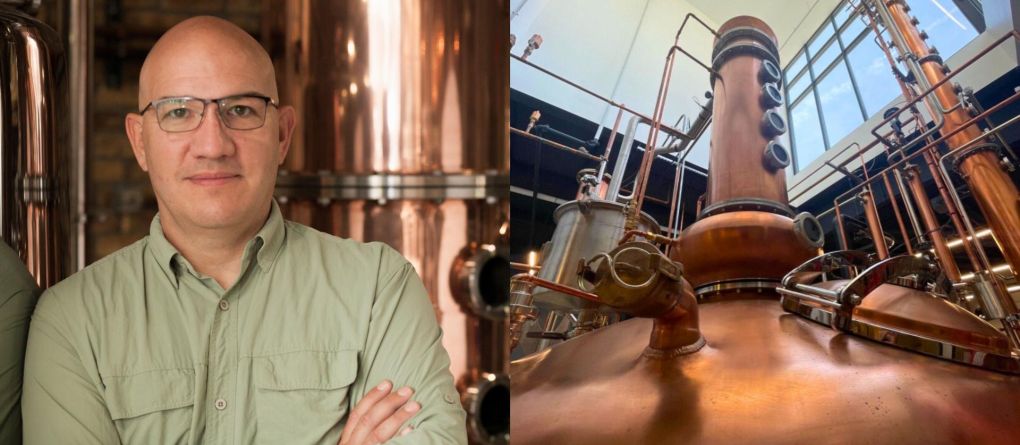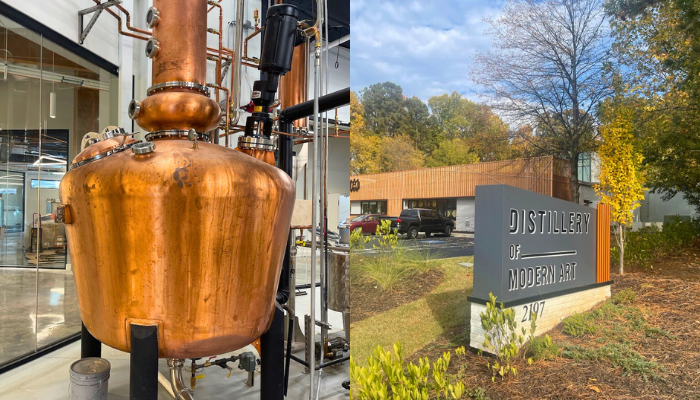
02/01/2024 Unlock the alchemy of spirits with Matt Greif, Head Distiller at The Distillery of Modern Art. From film to fermentation, dive into the art and science of crafting exceptional drinks.
Meet Matt Greif, the maestro behind the spirits at The Distillery of Modern Art in Chamblee, GA. With a background in the technical side of the film and television industry, Matt's journey into distilling started with curiosity and a thirst for knowledge. Now, as the Head Distiller, he brings a unique blend of science, creativity, and a commitment to quality to each batch.
In this exclusive interview, Matt shares insights into his daily routine, the inspiration behind his distilling journey, and his perspective on the challenges and trends in the spirits industry. From the intricacies of blending to the importance of sustainability, Matt provides a behind-the-scenes look at the art and science of crafting exceptional spirits.
Tell us a little about your background and journey into distilling.
I guess you could say I am still the new guy. I spent over 20 years on the technical side of the film and television industry while enjoying spirits before I ever thought it would be a good idea to be the person making them. Curiosity eventually got the better of me in regards to distillation and once that happens I tend to devour all of the information on a topic that I can find. Typically after a few months the the novelty wears off and I move on to the next idea but this one stuck. Two distillery build-outs and a master program in brewing and distilling later and I still am excited every morning to come here and make great spirits.
Your current role and what does your day look like?
I am currently the Head Distiller at The Distillery of Modern Art in Chamblee, GA. Here a typical day starts early because we like to beat the afternoon Georgia heat and morning traffic on 285 is the worst. We usually get the still turned on before 6 and begin mashing our recipe for the day shortly after. Currently, we are simultaneously mashing and distilling whiskey 5 days a week and filling out the production days with packaging and batch distillation on other products. Once everything is up and running I verify incoming raw material and barrel orders and plan and schedule upcoming production and packaging. As the day finishes, we clean and reset and prepare to do it all over again the next day. That sounds repetitive but every day is different and has new challenges and new things to learn.
What inspired you to become a distiller?
For me, it became about the science and learning new things. Also, every day brings new challenges and problems that need to be solved. It's never boring or routine. The inspiration came when I realized that there are ways to stay true to tradition when crafting spirits that have a long history but at the same time do things that are unique and groundbreaking.
How do you think a distiller can help in driving marketing and sales personally?
It's great that we live in a time when a lot of people seem to care about who is making what they eat and drink. Everyone seems to want to meet the chef brewer or distiller. Personal appearances are great along with distiller-led distillery tours that can go in-depth. Apart from that, it's my job to make sure that everything that leaves this facility in a bottle is of the highest quality. I believe there is nothing that makes the sales and marketing department's job easier than giving them something to sell that is top-notch.

Image Source: Matt Greif & The Distillery of Modern Art
Define a good distiller.
To me, a good distiller has to know the "why" of things. It's not enough to just know what the outcome of a fermentation or distillation will be when certain parameters are followed. To improve and excel I demand to know why something happens so that it can either be repeated, avoided, or manipulated to my advantage.
What is the hardest part of a distiller's job?
I'm sure this answer will be different for every distiller. For me, the hardest part of this job is being the person that everyone wants to meet and interact with as the maker. I'm naturally an introvert who is most comfortable in production and wearing work boots.
What are the current challenges the spirits industry is facing according to you?
Route to market is always going to be a challenge to small and medium-size producers. Self-distribution for startups should be an easy fix for this. Direct-to-consumer regulations and three-tier laws vary from state to state.
What is your idea of a good life?
Minus having the weekend cabin in the mountains, I am living the good life. I am excited to get out of bed and come to work every morning. I get to walk into a beautifully designed facility and through a changing modern art galley on my way to make whiskey while working alongside some of the hardest-working, intelligent, and amazing humans I've ever encountered. I get to be creative and collaborative and I get to see the look on people's faces when they light up after tasting something I've made. What could be better?
Which is your go-to drink and what is the perfect setting you enjoy it in?
Rye whiskey, neat, a mountain view.
Your favorite 2-3 distilling or spirits books?
I like books that are informative without too many fluff words. Both of Matt Stricklands' books are must-reads for distillers. He tackles Batch Distillation and Cask Management in a scientific way that is direct and in-depth as well as highly educational.
What do you look for in a supplier when sourcing bulk spirits / NGS if you do?
We do source NGS from various suppliers and quality of the product is always our first consideration. The amount of sample runs and trials we went through in making the decision on NGS for our products was extensive. Some people will tell you that spirits distilled to 192 proof will have no residual character remaining from the base grain or other fermentation substrate but that's simply not the case.
Take us through your process of blending.
What a lot of people forget I think is that just as in the maturation stage, time is also important during blending, I don't rush this process. I start with tasting through all of the source products and not just at barrel strength. Water opens up whiskey in wonderful ways. I then take extensive sensory notes on everything and circle the things that I want to be included in the final blend. From there all blending is done on paper first, looking at the sensory profiles and making a mental decision on how much of those qualities that I want in the final blend. After making initial blends I will walk away without doing any sensory for at least 24 hours because what you initially blend may be good but I can guarantee you it will change as the spirits mingle and all the compounds on the molecular level become friendly with each other. Then I start again making notes and repeating and refining this process until I'm happy.
How do you take care of production waste?
We are careful with all of our water usage and try to waste as little as possible. Glass and cardboard recycling are important during packaging operations.
How do you create complexity in the fermentation stage?
When you understand fermentation you have so many tools that can be utilized to not just create complexity but to shape and manipulate flavors for the better. When you look at it creating complexity during fermentation starts with substrate selection. Do the grains you are using have the properties that will make for optimal fermentation? Yeast needs more than just starch converted into sugar during the cooking stage to thrive and perform at its best. Proper yeast nutrition starts long before you add the yeast to the fermenter. Of course, strain selection these days is nearly limitless. Yeast are created and selected for very specific reasons by distillers and it's not just about how much ethanol they can produce. Add to that the fact that those same yeast will create different compounds in different environments so things like osmotic pressure or starting gravity of the wash, fermentation temperature, pH, and fermentation time are all controllable variables that affect the sensory aspects and complexity of the final product.
What steps do you take to become more sustainable?
In a distillery environment, water conservation is the key to sustainability. The cooling water on our stills runs off of a closed-loop chilling system and not from groundwater. We also use product water to cool down the hot mash before moving it to the fermentation tanks and we then run that water into a hot liquor tank in preparation for the next mash. This both cools the mash and pre-heats the water for the next run which then uses less energy to heat the strike water.
What trends do you anticipate in the beverage industry in the coming months? Or Where do you see the domestic craft distilling scene going? What's next for the industry?
Well, I cannot predict the future but I can tell you what I would like to see a lot more of. I think distillers and producers need to be having more conversations with growers and farmers. I think that we should all be using more heritage and non-GMO raw materials. I think that once distillers understand the science of things it's okay and even preferable to use specialty malts for flavor and complexity rather than high DP malts used only for conversion enzymes.
[[relatedPurchasesItems-31]]



